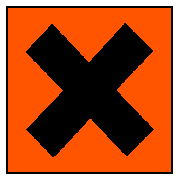International Chemical Safety Cards
| CHLORMEQUAT CHLORIDE | ICSC: 0781 |
CHLORMEQUAT CHLORIDE |
 |
| TYPES OF HAZARD/ EXPOSURE |
ACUTE HAZARDS/ SYMPTOMS |
PREVENTION | FIRST AID/ FIRE FIGHTING |
| FIRE | Not combustible. Gives off
irritating or toxic fumes (or gases) in a fire. |
|
In case of fire in the
surroundings: all extinguishing agents allowed. |
| EXPLOSION | |
|
|
| EXPOSURE | |
PREVENT DISPERSION OF DUST!
AVOID EXPOSURE OF ADOLESCENTS AND CHILDREN! |
|
| INHALATION | Cough (see Ingestion). |
Local exhaust or breathing
protection. |
Fresh air, rest. |
| SKIN | MAY BE ABSORBED! |
Protective gloves. Protective
clothing. |
Remove contaminated clothes.
Rinse and then wash skin with water and soap. Refer for medical attention. |
| EYES | Redness. |
Face shield or eye protection in
combination with breathing protection. |
First rinse with plenty of water
for several minutes (remove contact lenses if easily possible), then take to a doctor. |
| INGESTION | Excessive salivation. Sweating.
Visual disturbance. Diarrhoea. Dizziness. Headache. Laboured breathing. Nausea. |
Do not eat, drink, or smoke
during work. |
Rinse mouth. Refer for medical
attention. |
| SPILLAGE DISPOSAL | STORAGE | PACKAGING & LABELLING | ||
| Do NOT wash away into sewer.
Sweep spilled substance into containers. Carefully collect remainder, then remove to safe
place (extra personal protection: P2 filter respirator for harmful particles). |
Dry. Keep in a well-ventilated
room. In glass, high-density plastic, rubber or epoxy resin-protected metal containers. |
Xn symbol R: 21/22 S: 36/37 |
||
| SEE IMPORTANT INFORMATION ON BACK | ||||
|
||||